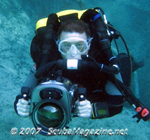A German arrested in the United States now awaits trial on charges of having tried to smuggle not a suitcase or two of contraband coral but 40 tons of it harvested off the coast of the Philippines.
Gunther Wenzek, owner of CoraPet in Essen, Germany, appeared in federal court last Friday in Alexandria after his arrest Wednesday at Washington's Dulles International Airport. He had been on his way to the Global Pet Expo in Orlando, Fla.
The indictment alleges that Wenzek tried to smuggle the coral through the port in Portland, Ore., in 2007.
The coral came from the Philippines, which bans all coral exports. U.S. laws ban importation of wildlife harvested in violation of foreign laws.
Wenzek is expected to face trial in Portland, where a grand jury had indicted him in July 2008.
The indictment had been sealed so as not to tip off Wenzek before his trip to the Global Pet Expo.
According to the indictment, Wenzek over the years has sold coral to retailers in the United States.
"An investigation was launched in 2007 after Wenzek tried to ship a container loaded with fragments of endangered coral from reefs off the Philippine coast to Portland," the U.S. Justice Department said in a statement. "After this initial shipment, agents subsequently seized two full containers of endangered coral shipped by Wenzek to a customer in Portland. These two shipments made up a total of over 40 tons of coral."
Officials first began looking into Wenzek earlier in 2007 when a federal customs agent in Portland came across a shipment whose manifest stated it was rock, broken gravel and coral sand.
The agent felt it looked more like chunks of coral and sent it back to the Philippines but kept some for analysis — which later turned up an endangered species of coral.
Studies in recent years have concluded that coral around the world could become extinct by the end of this century if seas continue to warm.
Officials said that prosecuting the case was important to protect coral reefs and marine life in general.
"Preventing the further decline of coral reefs is of paramount importance in preserving our marine environment and fisheries," said John Cruden, acting assistant attorney general for the Justice Department’s Environment and Natural Resources Division.
Andrew Bruckner, a biologist from the National Oceanic Atmospheric Administration, added that "the removal of dead coral and live rock is of major concern for coral reefs, including those reefs protecting coastal communities from storms" by providing a natural barrier.
"These corals are the fundamental building blocks of the coral reef ecosystem," he added. "Unsustainable collection of coral frequently results in the loss of important nursery areas, feeding grounds, refuge for fish and invertebrates, and increased erosion of reef systems."






 Reply With Quote
Reply With Quote





